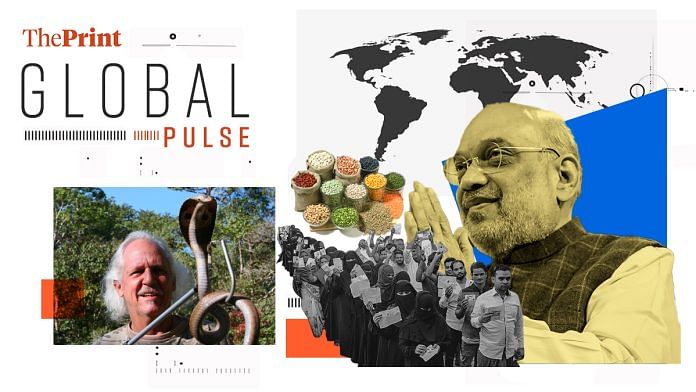New Delhi: Amit Shah’s journey to becoming “India’s second-most powerful man”, who is “reshaping the country in radical ways”, is reported by journalist Atul Dev in a Guardian long read — ‘He likes scaring people’: how Modi’s right-hand man, Amit Shah, runs India’. The report calls Amit Shah Prime Minister Narendra Modi’s “confidant, consigliere and enforcer” for 40 years, saying, “For Modi, he is what Dick Cheney and Karl Rove were for George W. Bush – the muscle as well as the brain – rolled into one.”
Since Modi’s second term, human rights organisations and international media have begun to worry about India, and in many ways, the object of concern each time is Amit Shah, writes Dev. He reports on Amit Shah’s working style by recalling events from the 1990 Ayodhya Rath Yatra, the 2002 Gujarat riots, the killings of Sohrabuddin Sheikh, his wife Kausar, and Haren Pandya, the death of Justice Loya, the government response to the protests against the Citizenship Amendment Act (CAA), and the revocation of Article 370, among other events. “Look at the story of Hindu nationalism in modern India, and you start to notice Amit Shah’s fingerprints everywhere,” Dev writes.
“Two-thirds of India’s unemployed youth are educated, a fraction which has doubled since 2000. As India votes, a question gnaws at its future: If education can’t get you a job, is it even worth it?” asks independent journalist Kunal Purohit in an Al Jazeera article, ‘India’s silent youth crisis: College-educated but poorer than a farm hand‘. Purohit speaks with young men like Maharashtra’s Shivanand Sawale, who aspired to be a teacher, but despite overcoming poverty and personal losses to earn advanced degrees, he earns less than a landless labourer, making just Rs 7,500 a month. This situation, says Purohit, is common in India.
Bloomberg’s newsletter by Menaka Doshi, ‘Modi Faces Fight or Opposition Dead Cat Bounce?’, highlights how PM Modi’s campaign intensifies anti-Muslim rhetoric as India’s election crosses the halfway mark, wondering if his aggressive tone betrays “a sense of weakness”. The Modi-led government’s $142 billion free food grain scheme targets 813 million Indians with branded bags featuring his image, and on the other hand, Congress has promised to double the free grain amount if elected, says Doshi. About how the election results will likely impact the markets, the report quotes Goldman Sachs’ Hiren Dasani as saying, “A Modi win or loss will render a short-term reaction, but is unlikely to hurt the medium to long-term direction of India’s equity markets.”
In ‘Wealth gap on voters’ minds as India’s richest city gears up for the election’, CNN reporters discuss the upcoming elections in Mumbai and voters’ concerns such as wealth gap and lack of education and job opportunities. BJP supporters credit Modi with infrastructural improvements, yet religious tensions under his tenure provoke criticism, they say. Speaking to CNN, grocer Sachin Chaudhary articulates a common concern: “The change I want to see is, things should become less costly.”
‘India’s parliament has fewer Muslims as strength of Modi’s party grows’, says a The Globe And Mail article, delving into Modi’s political victories that emphasise Hindu nationalist priorities, while denying Muslim migrants citizenship, revoking the autonomy of Kashmir, and constructing a Ram Mandir on a razed mosque site. PM Modi’s tenure has seen a decline in Muslim representation in Parliament, now at less than 5 percent despite Muslims making up to 14 percent of the population, says the article. From being a country where Muslims were largely marginalised, India has become a country where Muslims are actively excluded, Ali Khan Mahmudabad, a political scientist and historian at New Delhi’s Ashoka University tells The Globe And Mail.
In ‘From hunter to guardian: How the ‘Snakeman of India’ found his way into wildlife conservation’, CNN interviews Romulus Whitaker who has spent more than six decades dedicated to reptile research and conservation. He has written several books on snakes, spearheaded a lifesaving anti-venom programme, and launched wildlife research stations throughout India, inspiring many young conservationists in India, according to CNN. Reflecting on his career, Whitaker tells CNN, “People will remember me, like it or not, as a snake freak.”
Putin meets Xi Jinping, NATO mulls sending troops to Ukraine
Presidents Vladimir Putin and Xi Jinping met at the historic Great Hall of the People, the seat of power of the Chinese Communist Party, Thursday. To know more, follow BBC’s live updates. During the meeting, Putin reportedly said, “Russia’s strategic alliance with China in the energy sector will strengthen further” and “guarantee energy security” for China.
NATO allies inch closer to sending troops to Ukraine to train the Ukrainian forces, while the Biden administration says that there will be no American troops on the ground. Click here to know more.
(Edited by Madhurita Goswami)
Also read: Beijing is looking at Lok Sabha polls and blames Modi for fanning anti-China mood



